Search here
Newspaper
Search here

Arab Canada News
News

Published: June 1, 2022
The government refuses to disclose whether any of these orders relate to the protest convoy, the COVID pandemic, or the Ukraine war.
Prime Minister Justin Trudeau's government has adopted 72 secret orders-in-council—hidden from Parliament and Canadians—since coming to power.
More than half of the secret orders issued by the Trudeau government have been issued since April 2020, a month after the start of the COVID-19 pandemic. Eleven have been adopted so far this year.
While the Liberals criticized the Conservative Party in 2015 for adopting secret orders, the Trudeau government has adopted more than double the number of orders the Conservatives did over their years in office, with the Trudeau government adopting five secret orders-in-council in 2016, seven in 2017, eight in 2018, and 11 in 2019. The number rose to 21 in 2020 before falling to eight in 2021.
The government can prevent the publication of its orders in special cases, such as national security or military operations, or because the orders in question are related to reviews concerning the national security of proposed foreign investments in Canadian companies.
Opponents say there can be legitimate reasons for making secret decisions—but they are concerned about the large number adopted by the Trudeau government. They also say they fear that the government's refusal to disclose any of these decisions could fuel misinformation or conspiracy theories.
Lori Bousquet said 32 of the decisions adopted between November 2015—when the Trudeau government came to power—and March 31, 2021, were related to the Canadian Investment Act.
Lori added that during a six-year period under former Prime Minister Stephen Harper, eight secret orders-in-council related to the Canadian Investment Act were issued. During that period—from April 1, 2009, to March 31, 2015—the Harper government adopted 22 secret orders-in-council.
The Privy Council Office refused to disclose any details about these decisions, and four other secret orders-in-council were adopted on May 6—the day before Trudeau’s surprise trip to Ukraine. The Prime Minister’s Office will not clarify whether those orders were related to the conflict in Ukraine.
The Privy Council refuses to explain the reasons used to justify keeping unpublished decisions secret, or to state whether any of the decisions are related to the COVID-19 pandemic or the renewal of previous orders.
Usually, orders-in-council are published on the Privy Council Office website where Canadians and parliamentarians can see them. But a very narrow list of decisions can be exempted, allowing the information to remain unpublished or secret, and some government ministers may not be aware of them. While the Governor General must sign these decisions, the convention states that only four cabinet members need to sign the documents first.
Michael Chong, the Conservative foreign affairs critic, said Trudeau promised a more open and accountable government.
He said, “While unpublished orders-in-council are sometimes necessary, the number of unpublished orders-in-council under this government is cause for concern.” According to him, “The government must provide a more detailed explanation of why the number of unpublished orders-in-council has increased.”
And the NDP ethics critic, Matthew Green, questioned why there is no third party in Canada to review orders-in-council.
Editing: Dima Abu Khair
Comments